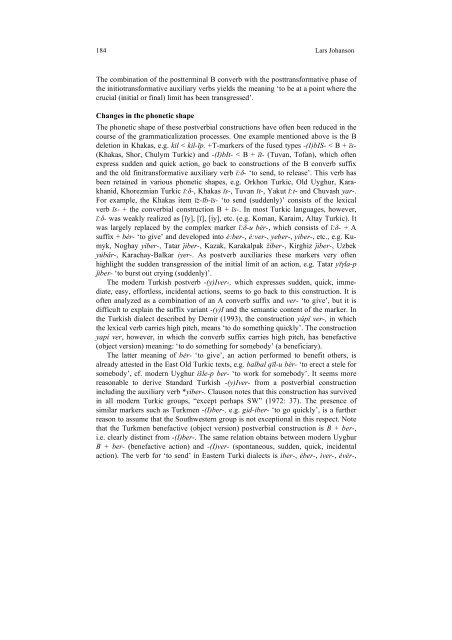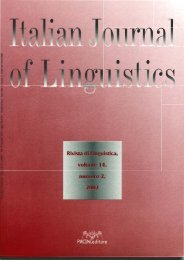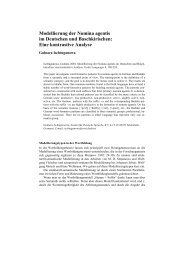On Turkic transformativizers and ... - Turkic Languages
On Turkic transformativizers and ... - Turkic Languages
On Turkic transformativizers and ... - Turkic Languages
You also want an ePaper? Increase the reach of your titles
YUMPU automatically turns print PDFs into web optimized ePapers that Google loves.
184 Lars Johanson<br />
The combination of the postterminal B converb with the posttransformative phase of<br />
the initiotransformative auxiliary verbs yields the meaning ‘to be at a point where the<br />
crucial (initial or final) limit has been transgressed’.<br />
Changes in the phonetic shape<br />
The phonetic shape of these postverbial constructions have often been reduced in the<br />
course of the grammaticalization processes. <strong>On</strong>e example mentioned above is the B<br />
deletion in Khakas, e.g. kil < kil-ĭp. +T-markers of the fused types -(I)bIS- < B + ïs-<br />
(Khakas, Shor, Chulym <strong>Turkic</strong>) <strong>and</strong> -(I)bIt- < B + ït- (Tuvan, Tofan), which often<br />
express sudden <strong>and</strong> quick action, go back to constructions of the B converb suffix<br />
<strong>and</strong> the old finitransformative auxiliary verb ï:δ- ‘to send, to release’. This verb has<br />
been retained in various phonetic shapes, e.g. Orkhon <strong>Turkic</strong>, Old Uyghur, Karakhanid,<br />
Khorezmian <strong>Turkic</strong> ï:δ-, Khakas ïs-, Tuvan ït-, Yakut ï:t- <strong>and</strong> Chuvash yar-.<br />
For example, the Khakas item ïz-ïb-ïs- ‘to send (suddenly)’ consists of the lexical<br />
verb ïs- + the converbial construction B + ïs-. In most <strong>Turkic</strong> languages, however,<br />
ï:δ- was weakly realized as [ïy], [ï], [iy], etc. (e.g. Koman, Karaim, Altay <strong>Turkic</strong>). It<br />
was largely replaced by the complex marker ï:δ-u bėr-, which consists of ï:δ- + A<br />
suffix + bėr- ‘to give’ <strong>and</strong> developed into ė:ber-, ė:ver-, yeber-, yiber-, etc., e.g. Kumyk,<br />
Noghay yiber-, Tatar ∆iber-, Kazak, Karakalpak žiber-, Kirghiz ∆iber-, Uzbek<br />
yuµbår-, Karachay-Balkar iyer-. As postverb auxiliaries these markers very often<br />
highlight the sudden transgression of the initial limit of an action, e.g. Tatar yï©la-p<br />
∆iber- ‘to burst out crying (suddenly)’.<br />
The modern Turkish postverb -(y)Iver-, which expresses sudden, quick, immediate,<br />
easy, effortless, incidental actions, seems to go back to this construction. It is<br />
often analyzed as a combination of an A converb suffix <strong>and</strong> ver- ‘to give’, but it is<br />
difficult to explain the suffix variant -(y)I <strong>and</strong> the semantic content of the marker. In<br />
the Turkish dialect described by Demir (1993), the construction yápï ver-, in which<br />
the lexical verb carries high pitch, means ‘to do something quickly’. The construction<br />
yapí ver, however, in which the converb suffix carries high pitch, has benefactive<br />
(object version) meaning: ‘to do something for somebody’ (a beneficiary).<br />
The latter meaning of bėr- ‘to give’, an action performed to benefit others, is<br />
already attested in the East Old <strong>Turkic</strong> texts, e.g. balbal qïl-u bėr- ‘to erect a stele for<br />
somebody’, cf. modern Uyghur išle-p ber- ‘to work for somebody’. It seems more<br />
reasonable to derive St<strong>and</strong>ard Turkish -(y)Iver- from a postverbial construction<br />
including the auxiliary verb *yiber-. Clauson notes that this construction has survived<br />
in all modern <strong>Turkic</strong> groups, “except perhaps SW” (1972: 37). The presence of<br />
similar markers such as Turkmen -(I)ber-, e.g. gid-iber- ‘to go quickly’, is a further<br />
reason to assume that the Southwestern group is not exceptional in this respect. Note<br />
that the Turkmen benefactive (object version) postverbial construction is B + ber-,<br />
i.e. clearly distinct from -(I)ber-. The same relation obtains between modern Uyghur<br />
B + ber- (benefactive action) <strong>and</strong> -(I)ver- (spontaneous, sudden, quick, incidental<br />
action). The verb for ‘to send’ in Eastern Turki dialects is iber-, ėber-, iver-, ėvėr-,




